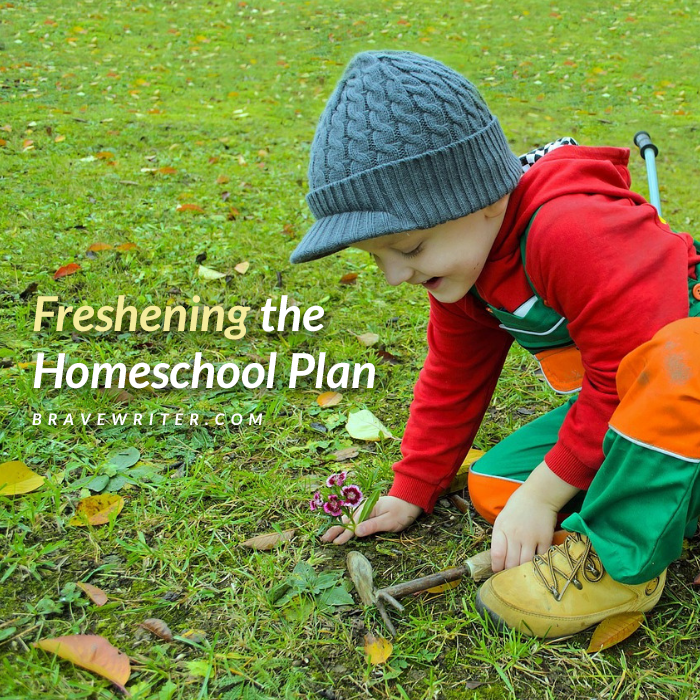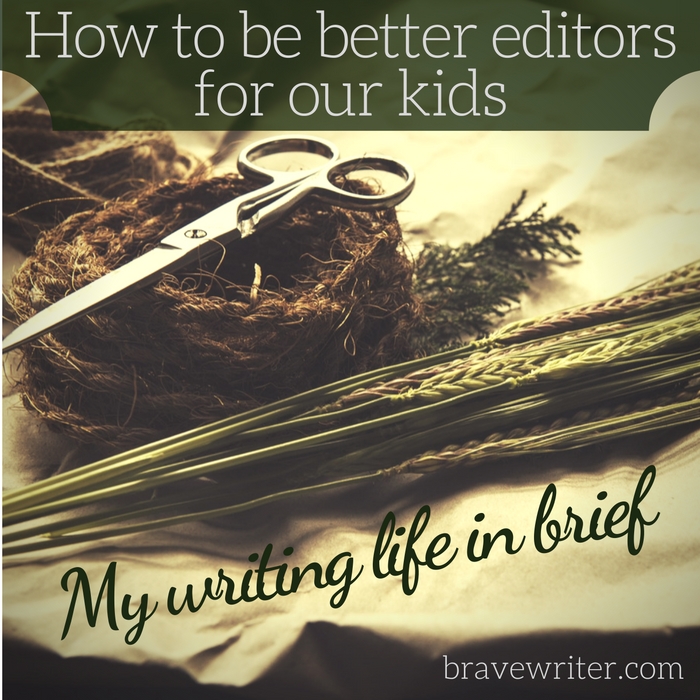So we wandered down Noah’s labyrinthine path to college. Let’s take a short cut to Johannah’s.
Her journey answers the following question: How do you do “one thing” at a time when you have to fulfill college entrance requirements? Or as my daughter so aptly put it in 10th grade:
I don’t get the saying that you should live as though you only have a week to live. That’s a stupid idea. We are required to live as though we’ll be alive next week, next year, in four years, in twenty years. What teenager can say, “I will live like I only have a week to live so I’m not going to spend it doing Algebra 2…”? But then, oops: “Uh-oh. I’m still alive and I need to put Algebra 2 on my transcript except, well, I went skateboarding instead.”
Johannah was bugged that she wanted to do all those little things that make life interesting but felt the press of requirements crowding out that spontaneous desire to make origami cranes for three weeks straight.
So let’s back up a bit and look at how Johannah tackled her future one thing at a time.
In eighth grade, I designed a schedule for Johannah to follow that would train her to work through a course of study with assignments and due dates. She had co-op classes (including biology, logic, theater and literature discussion), my writing courses, history and math. I felt really good about the carefully laid out plans, the weekly assignment sheet, the check list, the way each item neatly fit our targets for high school prep (when things would “really” count).
One morning, about six weeks into our carefully crafted plan, Johannah picked up her stack of books, moved to the living room sofa and declared, “I hate my life.” That comment, so utterly uncharacteristic of my daughter, stopped me in my tracks. What could she mean?
Over a cup of tea, I found out. She loved us, of course, but she knew all about us – what we ate for lunch every day, how we brushed our teeth, which TV shows we couldn’t miss. She knew how Liam and Caitrin bickered and made up. She knew how I’d present a lesson and what I would expect and what I wouldn’t. Childhood had been a Disneyland ride, but that ride was over. The little car had come to a full stop and she wanted me to release the metal bar clamped over her body so she could exit like the other travelers and head out to a new ride somewhere else in the park.
I got it. I saw the four walls of our house through her eyes: limits, boundaries, familiarity that no longer comforted, tedium. That wasn’t how the four walls appeared to me! I saw them as canvases for paint, as the boundaries that kept my kids protected, as the warm backdrops to teatimes and snuggled up read alouds. For Johannah, they were barriers to seeing the big wide world right outside the door.
That conversation led us to consider part time enrollment in the local high school for her. While that decision for Noah had proved to be completely incompatible with who he was, it seemed that Johannah could imagine nothing more wonderful than the inexhaustible opportunities to people watch. So we made a promise: get through 8th at home and come 9th grade, she could go to school a couple of hours a day. We modified her 8th grade program (she found some of my terrific ideas tedious – imagine that!). But what made the difference in her attitude was knowing a day would come when she’d get out of the house a couple of hours a day.
9th grade included to two school classes: Honor’s English and French 1. At home, we turned a corner. I had the following conversation with Johannah:
I want you to have a great four years and your dad and I will do everything you need us to do to make that happen. We’ll coach you in writing, Dad will help you with literature, we’ll provide you a math tutor, we’ll pay for extracurricular activities, I’ll create a transcript for college, we’ll invite your friends to our house.
What we won’t do is nag you, coerce you, tell you what to do and when to do it. If college is your aim, we’re happy to collaborate to make it a reality, but we won’t harass you into fulfilling requirements. That will be your job – finding out what they are (with our help) and then following through.
This strategy was perfect for Johannah. I stopped following up on her school work or even assigning it. She would come to me for advice about how to organize her time, what classes to take and would ask for help in fulfilling those objectives.
One Thing Lessons
Because Johannah was college bound, we did want to ensure that she fulfilled the requirements for her transcript. However, because we are a family much more interested in learning that checking boxes, we tailored her education to fit her personality and learning style.
For instance, math. Algebra had stumped Johannah in 8th grade. We waited. She didn’t start algebra until the spring of her 9th grade year. Then she did math year round with a tutor through algebra 2. We found out that Johannah was good at math when taught by someone other than me. We discovered that with a tutor, she could skip a week when she had too many other requirements, when the plays were in full swing. She could cover a chapter in more depth when it was challenging or she could move ahead quickly when she understood the ideas. Because math had not been her favorite subject nor her strong suit, using a tutor meant that math became manageable with the rest of her life. She did math one unit at a time, fitting it to her life (not the other way around).
She studied Latin one year starting in the summer (with a tutor) to see if she’d like it. By starting in the summer without any other subjects, she could give it the attention it needed and a fair chance of success.
She participated in a Shakespeare company that included summer camps and year round acting training. This program also included textual analysis which provided her with her best vocabulary development of all the things she did during high school. As a result, we didn’t do a formal lit program her sophomore or junior years of high school.
She continued French, took chemistry (hardest class of the four years), and electives like AP psychology, sociology, human sexuality, acting, economics, and government at school spread out over four years. Chemistry was a bear. I wanted her to quit about six times. Jon had a different point of view. He felt that rather than think about learning chemistry as the objective, Johannah could use that class to learn how to pass a class when it was hard and not interesting. So he helped her think of test-taking strategies, she used the teacher’s tutorial times to help her learn the material (every week), she did all extra credit and I sat with her going over the chapters she read each night during the first quarter to be sure she was understanding what she was reading. We adjusted our other expectations to make extra space for chemistry that year.
It worked. Johannah not only passed chemistry, but she learned how to learn in a traditional setting even when it didn’t suit her temperament or interests. Because she was not carrying a full load (at school or at home), she could give that extra time to this challenging class without hating her life.
Johannah was heavily involved in extra-curricular activities: color guard, plays, psychology club, Darfur Awareness Week planning committee. I often wonder how she could have done all she did with a full load of traditional schooling.
What about history? Interestingly, Johannah doesn’t enjoy the study of history. Which stumped me. It was my major; I was a Sonlight mom. So we put it off.
Because we had done ancient history in 8th grade (and in some depth), I didn’t worry about it early on. But by senior year, she did need to have studied US History for admissions to the colleges she chose. So we did a crash course. I taught her every night for six weeks using the SAT 2 prep book. Then she took the test and got a better than passing score. I happily checked that box at the end of it. It struck me that she may not have had the level of depth in history that some people consider necessary. However, even with a major in history, I noticed that I have not retained all the details of history over the course of my adulthood. It’s been a process of layering. I grasp it better and better as I age. She will too since learning is not limited to the years under 22.
What we discovered with Johannah is that we could organize her learning into blocks. Rather than having to take seven courses every day over four years covering all of the subjects, we figured out how to manage the stressful courses one at a time, how to stagger the expectations so that she could learn the subjects that challenged her most with the greatest support that she needed, all while meeting her social needs through school.
So Johannah took math with a tutor during summers and during the years she didn’t take chemistry. The year she took chemistry, she wasn’t writing papers for an English class. When she wanted to try Latin, she did it with a tutor in the summer to get started to see if she’d like it. In her sophomore year, when she discovered that the Honor’s English class in school felt like a dud (she couldn’t bear students hating on Shakespeare), she dropped the class. She and her dad set up a lit discussion group in our home with four of her best guy friends. They met every other week, reading a great book and discussing it together over the year. No writing, as a matter of fact. Does this approach to learning remind you of anything? College! That’s how it’s done. You take a few classes at a time, intensively.
She built her tolerance for school classes going two hours a day in 9th grade, then three in 10th, then four and four in 11th and 12th. She never did go full time so that she could still pursue her own interests outside of school (which included a daily date with Oprah and a nap :)). Interestingly, Johannah earned a 5 on her AP pysch test and had her highest GPA during the last semester of her senior year. She made a great comment:
I never got senioritis. I wanted to do all my homework right up to the end and did it. I still liked my classes. I wanted A’s. I guess I never burned out on school. It still interested me. I wanted to learn the content and I liked being there. I didn’t understand why other kids were so glad to be done. Then I realized I hadn’t been “doing school” the way they’d been doing it for 12 years.
We’ll look at what I make of all this in tomorrow’s blog.





















